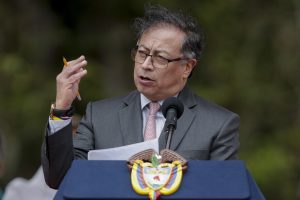Colombia Faces Environmental Emergency amidst Rampant Vegetation Fires

Photo: AP
Colombian President Gustavo Petro announced on Wednesday his decision to declare a state of natural disaster. This declaration comes as an immediate response to the widespread fires that have been exacerbated by high temperatures and the meteorological phenomenon known as El Niño. The declaration is set to unlock critical funds aimed at enhancing the country’s firefighting efforts and mitigating the environmental crisis. Colombia, a country heralded for its rich biodiversity and lush landscapes, is now facing one of its most severe environmental challenges. The fires have swept across the nation’s diverse ecosystems, leaving a trail of destruction that threatens both wildlife and human populations. The emergency declaration by President Petro underscores the gravity of the situation and the urgent need for a coordinated response. El Niño, a climate pattern that occurs when the surface waters of the Pacific Ocean warm significantly, has been a major contributing factor to the current crisis. It often leads to dry weather conditions in various parts of South America, including Colombia. The resulting aridity has created conditions ripe for wildfires, which can start from a mere spark and rapidly grow out of control due to the dry vegetation. The environmental repercussions of such fires are immense. They destroy habitats, decrease air quality, and release large amounts of carbon dioxide, contributing to climate change. The loss of vegetation also leads to soil erosion and reduces the land’s ability to capture carbon, exacerbating the effects of global warming. For Colombia, a country that prides itself on its natural resources and is home to a significant portion of the Amazon rainforest, the consequences are particularly dire.

















